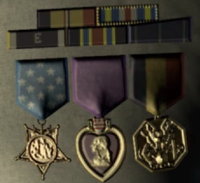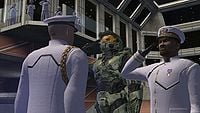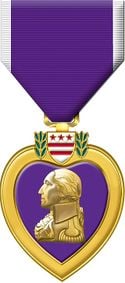Purple Heart: Difference between revisions
From Halopedia, the Halo wiki
mNo edit summary |
|||
| Line 1: | Line 1: | ||
{{Era|Human|UNSC|HCW|Post}} | {{Era|Human|UNSC|HCW|Post}} | ||
[[File:Purple heart.jpg|right|thumb|The United States Purple Heart|125px]] | [[File:Purple heart.jpg|right|thumb|The United States Purple Heart|125px]] | ||
Revision as of 13:05, July 16, 2011


The UNSC Purple Heart is one of the oldest and most honorable awards given in the history of human conflict. Originally conceived by Military Officers of the Earth country, the United States of America in the 1700s, the Purple Heart is still awarded in the UNSC over 800 years after its conception.
The UNSC Purple Heart is awarded to UNSC troops who have been injured or killed by enemy attack in combat situations with enemies of the UNSC. This may include combat with rebel factions such as the United Rebel Front or the Covenant. The Purple Heart has been awarded to huge numbers of UNSC troops, as a great many have been injured fighting the Covenant.
The Award was mentioned several times throughout Halo: The Fall of Reach and Halo: First Strike, but it was never actually seen until Halo 2. In fact, every Marine seen in a dress uniform throughout Cairo Station in the level Cairo Station wears only a Purple Heart medal, with the exception of Lord Hood, who also wears the Medal of Honor and the Navy and Marine Corps Medal.
Interestingly, the medal's appearance for the most part has not changed at all since its original appearance, conceived for the military of the United States of America in the year 1932. The only difference between the medal in-game compared to in modern day, is the medal lacks the white stripes on the edge of the ribbon. The medal even bears the same George Washington engravement as the original, paying homage to the man who first created a medal for troops wounded in battle for their country.
Notable Recipients
- Fleet Admiral Sir Terrence Hood[1]
- Captain Jacob Keyes[2]
- Ensign William Lovell (2 counts)
- Master Chief Petty Officer of the Navy John-117[3]
- Sergeant Major Avery Johnson[4]
- Senior Chief Petty Officer Franklin Mendez (3 counts)[5]
Sources
- ^ Halo 2, level Cairo Station
- ^ Halo: Combat Evolved, level The Pillar of Autumn
- ^ Halo: The Fall of Reach, page 94
- ^ Halo 2, level The Armory
- ^ Halo: The Fall of Reach, page 95
